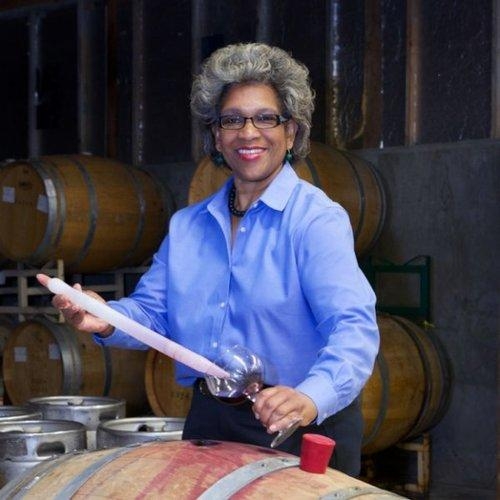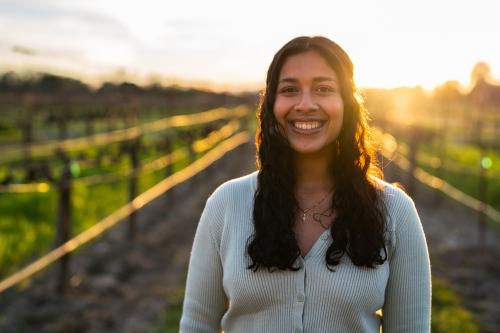
Theopolis Vineyards Diversity Fund created for viticulture and enology students
Donor Theodora Lee took classes at UC Davis and wants to foster opportunity
February 25, 2022—A new award fund has been created to help students interested in the wine industry pursue their degree in the Department of Viticulture and Enology at UC Davis.
The Theopolis Vineyards Diversity Fund will provide one scholarship of up to $10,000 each year to students interested in viticulture and enology and related research or managing a vineyard, with a preference for students who are underrepresented or understand barriers to entering the industry.
Theopolis Vineyards founder Theodora Lee took continuing education classes offered by the viticulture and enology department and donated $70,000 to create the fund, which awarded its first gift this year to a senior from South San Jose.
“As one of the few African American women who owns her own vineyard, I hope to inspire others to become vintners,” Lee said. “It is important that young folks know that they, too, can pursue careers in viticulture, vineyard management and even own a vineyard, and thrive in the wine industry.”
Lawyer and vintner
By day, Lee is a senior partner and trial lawyer at Littler Mendelson, which is the world’s largest labor and employment law firm. She was the first African American female managing partner of the Oakland branch of her firm.

Lee has seen more progress in the wine industry in the past two years than the previous 35 years in the world of law. “I am hopeful that the wine industry will become more diverse more rapidly than the legal profession as wine brings people of all hues together,” she said.
Known also as Theopatra, Queen of the Vineyards, Lee bought land used for sheep farming in the Yorkville Highlands of Anderson Valley in 2001 and began planting grapevines a few years later. Today the vineyard produces award-winning petite sirah, pinot noir, rose and other wines.
When Lee took classes at UC Davis, she was the only person of color. “If more diverse persons are trained as vineyard managers, wine makers or vintners, then the wine industry would be more diverse,” she said.
The viticulture and enology department has focused on increasing diversity and inclusion in its student body for more than a decade, establishing its Broadening Horizons program for that purpose in 2012, said David Block, a professor and chair of the viticulture and enology department. As a result of those efforts, the percentage of underrepresented students enrolled has increased to 25%, up from less than 10%.
Scholarship help
“Having awards like this one from Theodora Lee are really important,” Block said. “The hope is they enable people from diverse backgrounds to attend our program. We’re very appreciative of the support of our students.”

Awards and scholarships allow students to focus on their studies and reduce college debt, which could be the difference between a student applying for career-enhancing internships or not.
“If students have a lot of debt they may not be able to consider those opportunities, which can be very formative,” Block said. “It could be the difference between finding a direct career path or not.”
For Iona Joseph, the first award recipient, the money helped pay off the rest of her senior year tuition. “I’m very grateful for it,” she said.
Joseph, who works as a lab assistant studying drought and heat tolerance in North American grapevines, has applied to the master’s program in viticulture and enology at UC Davis.
Expanding diversity
She worked at a vineyard this summer during harvest and called the lack of diversity in top jobs surprising, making her think about her future in the industry.
“I’m a student of color,” said Joseph. “I think representation really matters. I want to see people who look like me in leadership positions.”
Joseph, who is chair of the diversity, equity and inclusion committee for the student group Davis Enology and Viticulture Organization, said that representation signifies recognition and appreciation of skills.
“It’s really important for our students to see role models,” Block said.


